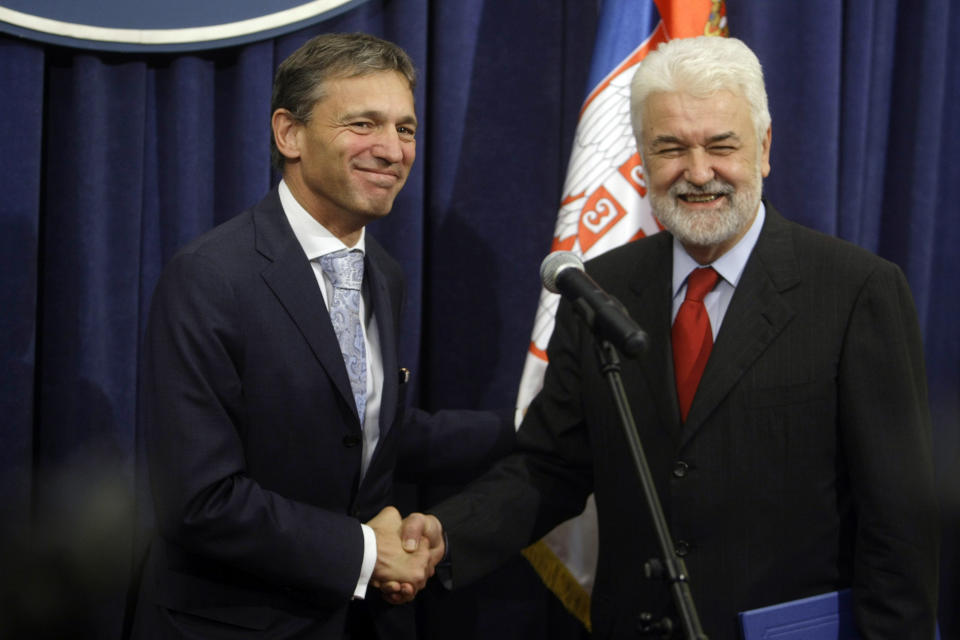Serbia gets to be a candidate to join the EU
BRUSSELS (AP) — The European Union granted Serbia candidate status Wednesday but refused to set a date to begin formal accession talks into the 27-nation bloc until Serbia and neighboring Kosovo improve relations.
The move was bittersweet for Serbia, because it had expected to get a date for the start of the negotiations after the arrest earlier this year of war crimes fugitive Ratko Mladic and his extradition to the international war crimes court.
"We recommend that accession negotiations be opened as soon as Serbia achieves further progress in the one key priority ... the negotiations with Kosovo," EU Enlargement Commissioner Stefan Fule said Wednesday
In Belgrade, Serbian President Boris Tadic said he was proud that the EU had recognized the advances Serbia has made in terms of democratization and other reforms.
Kosovo, a former southern province of Serbia that came under international control after a 1999 war in which NATO forces ejected Serbian troops, declared independence in 2008. Serbia refuses to recognize it because it considers Kosovo the cradle of its statehood and religion.
Kosovo welcomed Wednesday's announcement, saying it undermines Serbia's two-pronged policy of seeking EU membership while keeping its claim over Kosovo alive.
"It's natural and logical," Kosovo's European Integration Minister Vlora Citaku told The Associated Press. "There cannot be two Serbias: one European toward Brussels and one anti-European, toward Kosovo."
The U.S. and most EU nations have recognized Kosovo's independence, but five EU members — Cyprus, Greece, Spain, Slovakia and Romania — have refused to do so.
The Council of Ministers, the EU's decision-making body, is expected to endorse the commission's recommendations in December.
For much of the past decade, Mladic's arrest and delivery to the U.N. war crimes tribunal in The Hague, Netherlands, was the key stumbling block for Serbia's EU aspirations. Mladic was indicted for genocide following the 1992-1995 war in Bosnia during which nearly 100,000 people died.
EU has not set recognition of Kosovo as a formal requirement for Serbia's candidacy, but it insists Serbia establish "good-neighborly relations" with its former province.
Serbia has vowed never to accept Kosovo's secession. Still, the two sides have been holding regular EU-mediated talks on practical issues such as border regulations and recognition of each others' official documents. Citaku said Kosovo authorities were willing to continue the talks.
The EU commission did recommend that the EU open accession talks with Montenegro. Unlike Serbia, the candidacy of the tiny nation of 625,000 is regarded as relatively uncomplicated. But it, too, had to wait almost a year before the EU ruled its conditions had been met and talks could start.
"Montenegro has worked hard last year," Fule said. "We have seen real progress in all areas."
Once accession negotiations start, they usually last several years. Croatia, which is scheduled to become a full member in July 2013, opened its talks in 2005.
In contrast to Montenegro, the EU commission said Bosnia's progress had been "very limited." The EU did not recommend any new initiatives for the ethnically divided nation, which has been without a government since elections last year.
The commission also cited Albania's ongoing political stalemate as the main reason that "conditions for the opening of accession talks have not yet been met."
Macedonia — which became a candidate nearly six years ago — remains in limbo because of Greece's objections to its name.
The nations of the Western Balkans are seeking EU membership because they expect it will strengthen their democratic transformation and because they hope it will boost their economic competitiveness.
The EU's main motive in trying to integrate the region — historically the powder keg of Europe and source of numerous wars — is to pacify it and integrate its 22 million inhabitants into its economic region.
But the integration of the Western Balkans into the union has been slowed in recent years by the EU's preoccupation with its own institutional reforms and with the current debt crisis. The bloc also has been affected by "enlargement fatigue" after accepting 10 new members in 2004 and two more, Bulgaria and Romania, in 2007.
The EU is pressing forward in accession talks with Iceland, which sought membership after the 2008 financial crisis that caused the collapse of the country's banks and gutted its currency.
The report said although Iceland meets the political criteria for EU membership, difficult negotiations can be expected in key areas such as fisheries and the free movement of capital.
But membership for Turkey remains a distant prospect. The report encouraged Turkey to improve observance of human rights and called on Ankara to resolve its problems with EU member Cyprus.
Cyprus joined the European Union in 2004, but the divided island's breakaway north, where Turkey maintains 35,000 troops, has been effectively left out.
___
Follow Slobodan Lekic on Twitter at http://twitter.com/slekich




